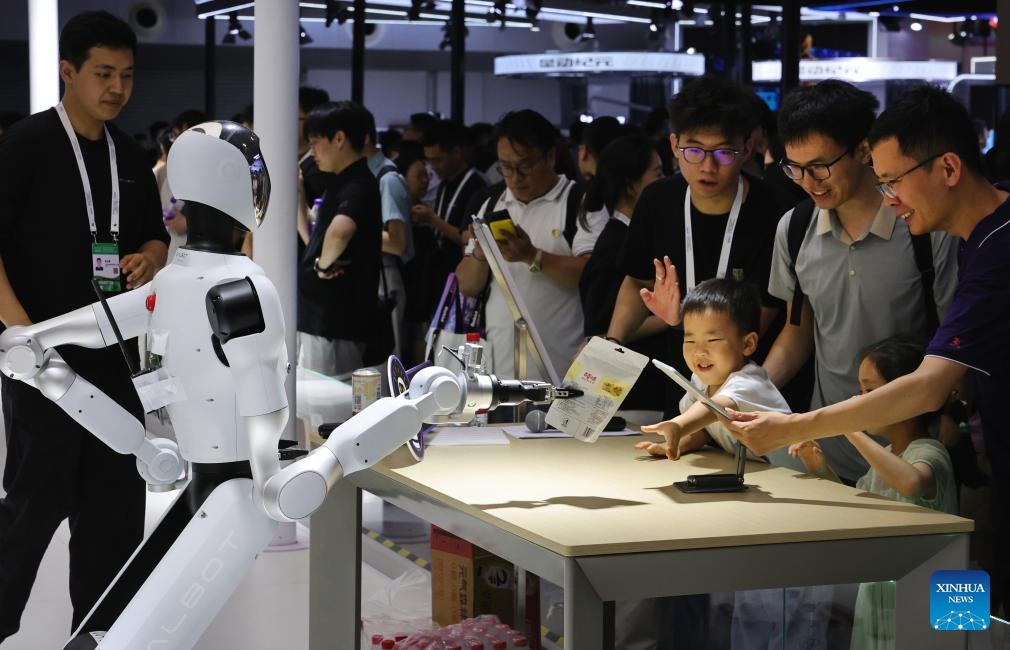BEIJING: The city of Shanghai published an action plan on Wednesday for the development of the embodied artificial intelligence (AI) industry, aiming to build a global innovation hub for this emerging field. The plan also seeks to accelerate technological breakthroughs in algorithms and technologies, including embodied models.
According to the plan published on the Shanghai Municipal Government’s website, the city vows to achieve at least 20 breakthroughs in core algorithms and technologies by 2027, including embodied models and linguistic corpora. It also aims to establish four incubators, aggregate 100 key enterprises, deploy 100 innovative applications, promote 100 leading products, and grow the core industry scale to more than 50 billion yuan ($6.95 billion).
Embodied intelligence integrates AI into physical entities like robots, enabling them to perceive, learn and interact with their environment like humans. Its core feature lies in combining intelligence with physical forms, allowing AI to understand causality and develop common-sense reasoning through interaction with the environment, according to Shanghai’s economy and informatization commission.
Analysts and industry participants noted that Shanghai has a robust industrial base in robotics – the scale of the robot industry in Shanghai accounts for about one-third of the national total – which will support the development of embodied AI.
The action plan has clear goals and powerful measures, outlining a comprehensive development path from “brain” to “hands,” Wang Peng, an associate research fellow at the Beijing Academy of Social Sciences, told the Global Times on Wednesday.
At the “brain” level, Shanghai will prioritize breakthroughs in key technologies, such as perception-decision models, motion control and autonomous operating systems. For open-source communities and open-source products, rewards of up to 5 million yuan will be given in accordance with regulations, according to the plan.
In terms of “hands,” the city will advance the development of core components critical for scaling humanoid robot production, including precision motors and sensors, accelerate the research and development (R&D) of computing chips, and enhance core motherboard R&D and performance.
Apart from technologies, a key focus of the plan is the deployment of application scenarios. Leveraging its industrial strengths, Shanghai will drive new business models for embodied AI in sectors such as logistics and assembly, industrial manufacturing, commercial retail, healthcare and eldercare and home services, fostering innovative applications tailored to these fields.
In order to push forward the embodied AI industry, Shanghai also vows to build industry clusters in Pudong’s Zhangjiang township, enhancing regional collaboration within the Yangtze River Delta.
Humanoid robots and embodied AI are rapidly evolving, becoming new drivers of economic growth.
As China’s first AI innovation application pilot zone and key hub for embodied AI robots, Pudong has launched a three-year action plan to advance the humanoid robot industry, Jiang Lei, chief scientist of the Shanghai-based National and Local Co-Built Humanoid Robotics Innovation Center, told the Global Times on Wednesday.
“With Shanghai’s policy support, Pudong will accelerate the clustering of top enterprises, strengthen industry supply chains, and promote integrated development led by leading manufacturers,” said Jiang.
Pudong has aggregated more than 100 robotics-related enterprises, ranging from functional service platforms to software and hardware component companies, according to media reports.
The plan also pledges to leverage international events to enhance global cooperation, such as the just-concluded 2025 World Artificial Intelligence Conference (WAIC).
At the 2025 WAIC, embodied AI was a “top star,” with 36 humanoid robot enterprises attending, having showcased 208 embodied intelligent robots, according to media reports.
The development of embodied AI was highlighted in this year’s Government Work Report.
So far, more than 20 cities have set related development goals. Beijing aims to achieve more than 1,000 breakthroughs in key technologies, including embodied AI models, and foster a 100-billion-yuan industry cluster by 2027. Within the same timeframe, Shenzhen plans to add 10 companies valued at more than 10 billion yuan, with more than 1,200 enterprises in the industry cluster. The city of Hangzhou in East China’s Zhejiang Province has also introduced new policies to build application pilot testing bases.
“Shanghai’s embodied AI sector will likely achieve synergy in technology, applications and industrial clustering, injecting strong momentum into the industry’s development in the country,” said Wang. –The Daily Mail-Global Times news exchange item





